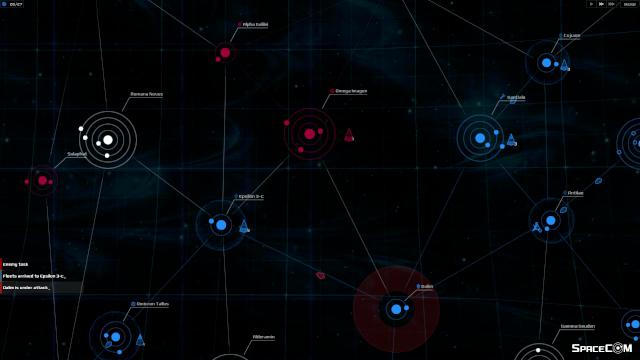
I like strategy games, but two things occasionally bug me if I’m in a slightly irritable mood: complexity and time. Take Civilization as an example, as that’s generally seen as the King of strategy games… it’s evolved to a state which demands hours of learning time and months of experimenting to become particularly good at it, and even though it’s still great fun to drop the difficulty and annihilate your enemies for the joy of seeing those ever-fun nuclear explosions, you’re still looking at at least half a day’s worth of gaming time to reach the conclusion. And that’s assuming you go all out to win as quickly as possible. Civilization V is an excellent game, but the very nature of it demands something a lot of gamers just don’t have: an abundance of time.
Step forward Spacecom, a space-based strategy game which does away with intricate unit models, kicks month-long games in the face and focusses on the thing that really matters: outsmarting your enemies. There’s only three types of ship on offer: Battle fleets let you attack other spacecraft and blow them up a bit, Invasion ships can be used to capture various areas of space and the Siege crafts just let you go all out crazy and blow up planets, rendering them entirely useless to both yourself and your enemy. Whether you choose to capture or destroy depends entirely on how you’re approaching the game – do you want to keep hold of as many assets as possible but risk having them snatched back, or just keep a core set of systems secure while trying to starve your opponents of handy places to run repairs, build new ships and create resources?
Of course it’s not all about going in for the kill, there’d be very little strategic decision making in a game which focussed on all-out attack the whole time. Shields, ground forces and defence grids can all be set up to make sure that you have a fighting chance when a squadron of destruction is coming your way, and deciding on the balance of defending and attacking is one of the most challenging aspects of the game. The great thing here is that you can actually focus on these strategic calls, thanks to the simple and super-intuitive controls which have you zipping around the galaxy map like you’ve been at it for a year, even after your first half hour of play. There’s also an element of air traffic control here too, with simple visuals giving you more chance to worry about tactics than how pretty any particular unit looks. Ships are made up of a triangle split into three sections, and with each ship filling one of those three sections it’s easy to see what’s in a stack of ships by which combinations of areas are shaded. It takes a few games to fully automate the link between the triangles on the screen and what their function is, but once you get to grips with it you’ll be flicking your eyes across numerous travelling triangles and instantly know that it’s a Siege ship heading to destroy an enemy stronghold, accompanied by a couple of Battle ships in case things get a bit tasty at the other end.
The battles themselves are reported in a very simple and clear manner too, with a simple scale letting you know how well you’re doing (such as “losing slightly”) as well as individual health meters for each craft in the battle. Once you’re in the fight you can try to run away, but if you’re damaged enough to try that then chances are the other guys will be hunting you down to finish off the job before long. It’s a risk and reward system, and one which comes even more alive when you start playing against other humans. The interface can get a little cluttered at these stages though, and I sometimes found a planet’s information box or a battle report blocking other areas of the screen, not a game-breaker by any stretch, but quite annoying when it happens at a crucial stage.

With a great set of online multiplayer options, a game of outwitting a pre-programmed opponent suddenly becomes a finely crafted game of space-chess against another real brain. Another player toying with the idea of blowing up your planets, another player readying a huge attack fleet to come and overpower you to steal your resources, another player about to make a crucial mistake and lose the entire battle because of one rushed decision. Not only that, but anything up to five other players. That’s right, six of you can bomb around space trying to outsmart and outpower each other. It’s something very intense, very addictive and unlike similar games, relatively speedy to get through a whole game; after all there’s no option to save, so you’ll be glued to the screen until the last opponent (or you last ship) is nothing but space debris floating around on its way to nowhere. Playing online is always different to a single player option, but here it’s quite remarkable just how much more enjoyable it is.
So with Spacecom we’ve got a game which looks like it’s not going to offer much at all, but actually gives huge depth and some brilliant gameplay. Many will be put off by the simplicity of the visuals and the lack of variety in units and planet types, but that to me just makes a far more accessible and tactical game. With a few mates this could easily be a game which trumps many of its bigger budget strategy cousins, and with the shorter games on offer it’s a more realistic option for busier gamers too. Fans of strategy games would do well to take a look at this, you might just find something that surprises you.
Reviewed on PC


Leave a Reply